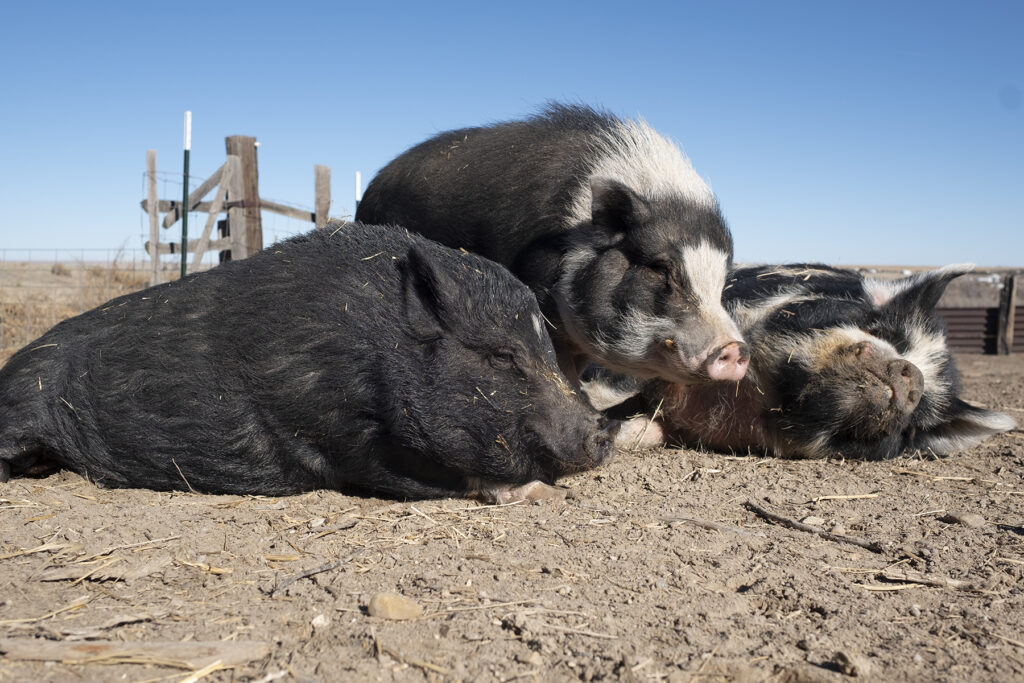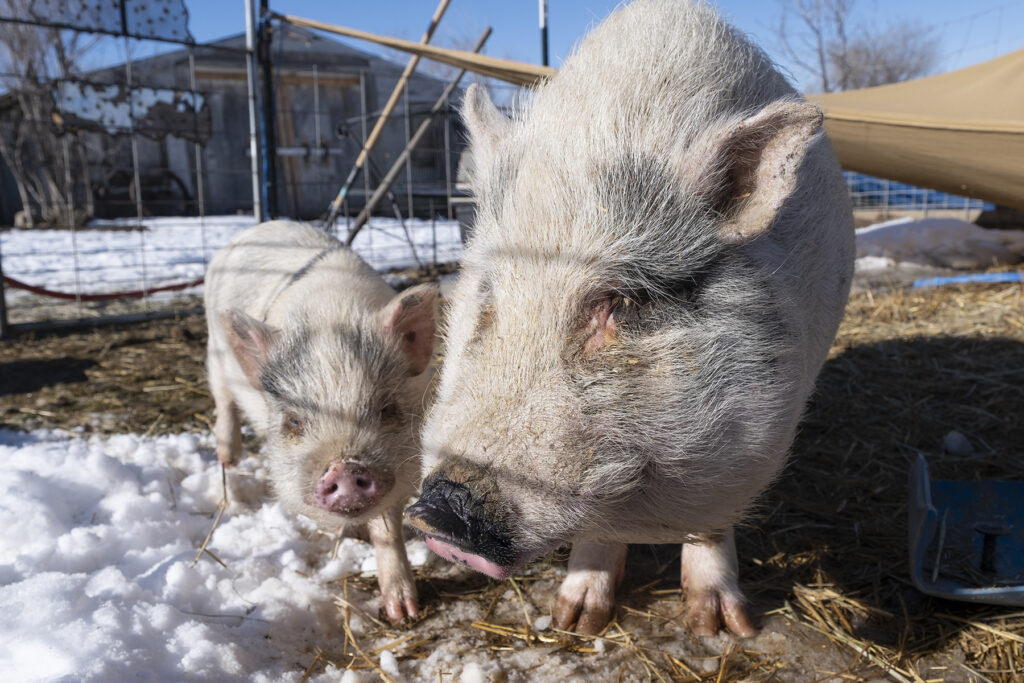Everything you need to know before bringing home a new family member
Undoubtedly, piglets are one of the cutest, cuddliest creatures on this earth. The wagging little tails, cute snouts, and fast movements (we call it the zoomies) make them a desirable pet. But, unfortunately, there is an epidemic in the United States with unwanted pet pigs. Researching pig parenting prior to adopting a pig is crucial.
Pigs are smart–the fourth smartest mammal, in fact. This can be good and bad! Intelligence means that pigs can be easy to train as house pigs–they will learn to use a litter box, pee pads, doggy door, or have other ways to let you know when they need to potty (like ringing a bell at your back door). They are clean animals, and do not like to defecate anywhere near their food or bedding. But they can learn undesirable behaviors, too–like opening your cabinets and refrigerator, knocking over the kitchen trash, and pulling your bedding down or stealing your laundry to make their own special sleep spot (called a nest).

Having a pig as a pet is rewarding, but they come with their own quirks. Understanding their behavior is important; they are not like dogs, as many people like to assume. Pigs really are more like perpetual human toddlers; they have temper tantrums, attitudes, and will repeatedly push your buttons as they test boundaries. So if this sounds like a lot for you to handle from the get-go, you may want to look at adopting an easier animal to manage instead.
Still think you want to bring home a pet pig? Here are a few important pointers for keeping one:
- Pigs need adequate space outside. As grazing animals, they like to munch on grass, dandelions, and other greens outside. They also have natural behaviors, like rooting, that are important to their psyche. While you don’t need a massive amount of land, having an outside area is critical. You can create a rooting area for a pig, so it won’t destroy your entire yard with it’s curious snout, but they do not do well cooped indoors all of the time. Don’t want your yard rooted up? A pig not might be the right fit.
- Pigs do not sweat. They need an area to cool off outside during the summer months, like a kiddie pool or even a mud hole, and need access to fresh water 24/7.
- A pig is a routine-driven creature. They like to have their meals at the same time every day, and will let you know (loudly) if you deviate from their schedule. Like deviate by minutes. They will also wake up with the sunrise, and head to bed at dusk. If you can’t stick to a routine, a pig is not a good pet for you.
- Pigs need companionship and attention. They love to have their tummies scratched, and to snuggle with you. They are not a good pet to keep if you work long hours or frequently travel, and therefore can’t provide regular attention and companionship.
- Pigs can coexist with other animals, but are not a good combination with dogs. But there are so many cute dog and pig videos on Instagram! We cringe every time we see these videos. While dogs and pigs can coexist, they do not understand each other. Instinctually, dogs are predators and pigs are prey. Normal pig behaviors, like squealing or running, may trigger the predator instinct in your loving family dog, and that’s it–the pig has no way to defend itself from the attack. Additionally, pigs have different methods of communication that dogs may find annoying. Pigs and dogs must only interact under strict supervision, and never be left alone together.
- Pigs are dominant animals, and will try to be alpha in your household. If not properly trained, a dominant pig can be aggressive (especially to house guests and strangers), and become rude when they want something. You must learn dominance training to be alpha to your pet pig, otherwise, they will not be a fun family addition.
- There is no such thing as a teacup pig. Yes, mini pigs are real–they are also referred to as potbellied pigs, Juliana pigs, micro-mini pigs, etc. But these labels are not a breed of pig–they exist for breeders to sell more piglets. Mini pigs range in size from 70lbs at the extreme low end to 300lbs at the high end, but in our experience, many of these minis stay in the 100-180lb range. Do not get a pig if you cannot handle the extreme high end of size. Much like humans, you will not know, even from seeing the parents, how big the piglet is going to be at adulthood. Often, the parents are just babies themselves, and not full grown when they start producing litters. Pigs can grow until they are 5 years old, although the skeletal structure stops growing around 3 years. Want to know the size before you commit? Please, please consider adopting an older pig. There are so many of them in need of a forever home, and you won’t have to worry about size if you choose one who is already done growing. Adults also have established behaviors, and are much easier to work with!
- Pigs are a lifetime commitment. They bond very closely with their people, and they grieve when they are separated. They will cry real tears when surrendered to a shelter, or sanctuary, or even a new home. Pigs live 15-20 years on average, so be prepared for the commitment.
- Do you rent your home? Wait until you’re a homeowner before committing to a pet pig. PLEASE. Many landlords will not accept pet pigs in rental properties, and it is totally unfair (and selfish of you) to bring home a pet you may not be able to keep. Renting is not stable–you may move once in ten years, every year, every couple of years….change is stressful to piggies, and if you have to move, there is no guarantee your pig can come with you. So please, if you rent, just don’t go there.
- Ensure your new piggy is spayed or neutered! Unspayed females have a heat cycle every 3 weeks, which leads to aggression and bad moods, and simply, not a fun pet to have around. Additionally, females can develop uterine tumors, cysts and/or cancer later in life, so making sure they are spayed leads to a longer, healthier life. Intact males will attempt to break out of fencing and enclosures, and will mount everything and anything they can, as well as emitting a strong, musky odor. They can also develop testicular cancer. If you are adopting a pig from Hog Haven Farm, all of ours are fixed prior to adoption!

Ready to adopt? Please fill out an adoption application to start the process. Since we are a rescue/sanctuary, we want what is best for the pig. It takes a bit of time to adopt through us to ensure best fit for the pig and for you, but if you’re ready and willing, it is worth the extra effort!